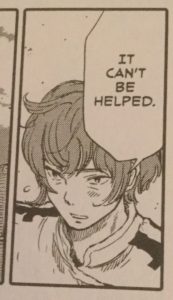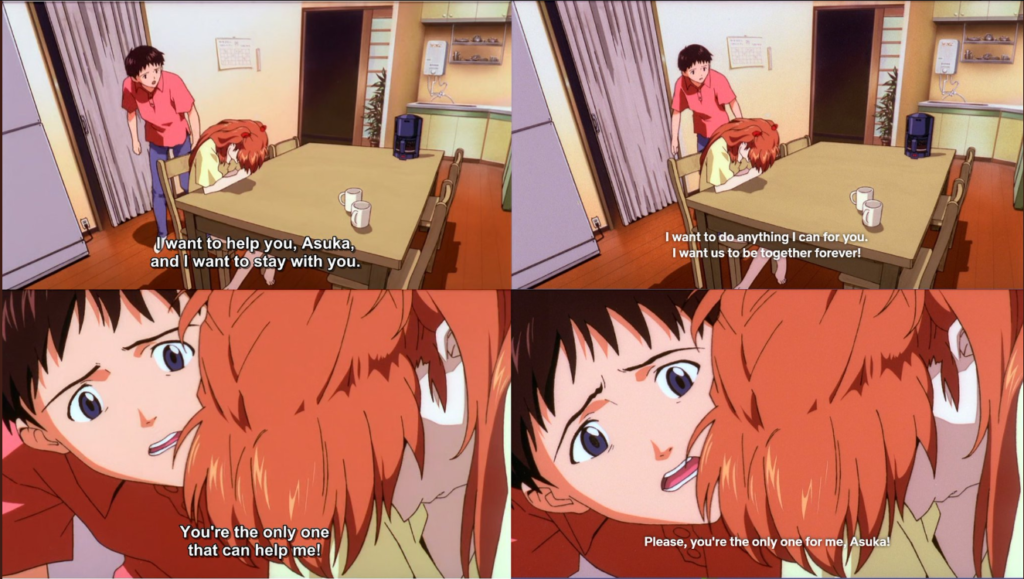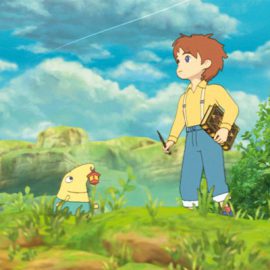The first thing I heard about the Netflix’s re-release of the 1996 cult-classic anime Neon Genesis Evangelion was: “WTF? They’ve removed Fly Me To The Moon.” Shortly after my Twitter was full of angry and confused people talking about the new release.
If you’re reading this then you probably already know what these differences are. Many, many websites and articles have already discussed some of the major differences and why people are upset.
If you don’t know and would like to, then checkout these articles:
- Anime Classic Neon Genesis Evangelion Is Finally on Netflix. So Why Are Some Fans Upset?
- Japanese Fans, Official Translator Weigh in on Netflix Evangelion English Subtitle Debate
- Why did Netflix erase the queerness of ‘Evangelion’?
So, What Went Wrong?
I am going to put a big spoiler here and say nothing went “wrong”.
There are, in fact, a number of back-end localization industry-related reasons for the changes in Netflix’s Neon Genesis Evangelion translation. I would like to discuss these in the hopes that people get a better understanding of translation and the localization industry as a whole.
Translators Are Human – We Have Personal Styles and Biases
Translation is a personal piece of work.
Translators take the original work in another language (e.g Japanese) and re-write it in our own words so that people of another language (e.g English) can understand it.
 Every translator has their own style. These styles can vary between mediums, but as a general rule you tend to have translators who are very literal with their word choices vs creative liberal translators who prefer to convey what would be more natural in English, or those who wish to create a particular emotion in the audience.
Every translator has their own style. These styles can vary between mediums, but as a general rule you tend to have translators who are very literal with their word choices vs creative liberal translators who prefer to convey what would be more natural in English, or those who wish to create a particular emotion in the audience.
Let me give one famous example in the translation industry – 仕方がない (shikata ga nai). This line is particularly indicative of a literal translator because they will translate it to “it can’t be helped”. But depending on the context this line could be translated as “fine then” / “oh, well” / “looks like the cat’s out of the bag” / “shit happens” / “fuck this” / “guess I’ll just have to” etc.
This direct vs literal translation isn’t a binary either. It’s a sliding scale of balancing wording, original intent, and characterization. Each translator tackles these choices differently depending on the situation.
My personal preference is to convey what a native English speaker would say, and try to give the audience as much enjoyment as possible. Judging from Dan Kanemitsu’s translation he prefers more literal translations of the original words. Which some people have said are clunky, but others praise for being “closer” to the Japanese.
I am not saying that one way is “more correct” than the other. (Goodness knows there are enough arguments on that topic already.)
What I do want to point out is that you can give 100 different translators the same translation, and they will ALL be different.
Another difference is personal biases.
All writers have their own biases which are shaped by the people they are and the world around them.
I, for one, tend to translate 少女 (shojo) as “woman” unless the character in question is a child, in which case I’ll say “girl”. (Or if a guy is being really derogatory to a woman by calling her a “girl”). That is one personal bias that I am conscious of. But I’m sure there are many others that I’m not aware of.
Dan Kanemitsu’s translation highly likely has biases in it. I don’t know if these are conscious or not but he clearly made translation choices which may have been shaped by his biases.
For example, when taking into consideration the queer erasure that many people are upset about, as well as Shinji and Asuka’s interactions, the translation choices implies a bias towards Shinji/Asuka.

However, I think every Eva fan has their own biases towards which character Shinji should be with, but it’s interesting to see this shaped in translation choices.
Saying that, some of Dan’s translation choices may have not been his own…
No Translator is an Island
“No man is an island entire of itself;
every man is a piece of the continent, a part of the main“
A translated text is the work the translator and the translator is the one who does the bulk of the linguist leg-work.
However, it’s not always just the translator working on the translation. Just like any mono-lingual writer, you have editors and proofreaders; people to check the quality and that it works.
But translation can be a little more complicated as you have the client (e.g Netflix) and/or original creators (e.g Studio Kara and Anno) weighing in on the translation.
And often the people who are changing and impacting your translation choices are not event native speakers of your language!
I’ve had many instances where the in-house editor of a client is Japanese. Having a native Japanese checker is great! …If they run their edits past you first. When they changed things in the final version without checking it can be really bad. This is because their English isn’t native enough to make translation choices that will benefit the final text.
For example, I once worked on the website of a fancy resort. One of their headers was 宇宙に近い (sora ni chikai), which I translated to “Touch the Sky”. (Followed by how clear the sky is in middle of nowhere because there’s not light pollution. But when the website went live I saw they had changed (aka directly translated) it to “Close to Space”. This didn’t work in English. “Close to Space” makes an English naive think “outer space” not “clear skies”.
I don’t know who exactly had influence over the Netflix translation. But I doubt it was just Dan Kanemitsu working alone, without his translation tweaked or influenced in any way by other people.

The Companies & Clients We Work for Have the Final Say
Speaking of clients, they are the ones with the final say.
Unless a translator has a very long and close relationship with a client, the client’s word is final. We can try to persuade a client as much as we like, but what the client says, goes!
Take Persona 5 English localization, for example. It was the Japanese client, Atlus, who wanted the voice actors to miss-pronounce he Japanese names with an annoying American twang. A trained voice actor could have easily adjusted to the correct intonation, but they were specifically asked not to for the English dub.
Dan Kanemitsu has worked on Studio Kara anime before (including Evangelion: 2.0 You Can (Not) Advance). So he’s very familiar with Evangelion and Studio Kara. But I don’t know if he worked with them directly or not (possibly through a 3rd party who was hired by Netflix?).
Either way, I’m sure Studio Kara had input on at least the English localization. And I wouldn’t be surprised if they got final say over the English translation.
But as I said, native Japanese speakers (unless brought up bilingual) often do not understand English, or even localization, enough to make an educated decision. So if they did have input, it doesn’t mean the final quality will have been better off for it.
Legal Stuff is a Pain Too (AKA – Licencing Agreements!)
This is probably THE BIGGEST factor to have influenced the Netflix’s Neon Genesis Evangelion translation: Legal issues.
I mentioned that the translation is a piece of writing created by the translator. However, often this work is sold or contacted by a company who owns the rights to that translated text. They own the rights to every single word choice made in that once instance.
This means buying the translation rights from someone can get very expensive. So it can be cheaper to just create a new translation!
However, because another company owns the rights to the words of the previous translation, almost everything in the new translation needs to be different.
This means that because Netflix couldn’t get the rights to the original translation; the new translation had to use different wording. It had to be different.
In some cases a translator will even have to check the original translation with their own to make sure there is no overlap.

What Went Wrong with Netflix’s Neon Genesis Evangelion Translation?
As I said at the beginning, nothing went “wrong”. The Netflix’s Neon Genesis Evangelion translation is a valid interpretation of the source text.
But the translation choices made in this translation were highly likely shaped by a number of factors.
A translators style and biases impacts word choices. These word choices could have also been shaped by other people working on the text, as well as the client’s and original creator’s inputs. And finally, legal issues for a re-translated piece of media like this, probably played the biggest factor in not just translation choices, but the actors involved too.
Word choices are important because they impact how the audience interprets the medium themselves.
This is why people are upset. Because the language used gives a different interpretation from the previous interpretation they’re used to. In doing so it tells a slightly different story and changes the relationships between the characters.
For a cult-classic like Evangelion that might not have been the best choice. Whether the translation is “right” or not, the audience’s enjoyment is the most important. It’s why we translate. To entertain the audience.
I hope that non-localization industry people found this article insightful. Of course reality is always a little more muddy than we might initially think. It’s important to remember that rather than throw around accusations and harass translators for what you might think are “wrong” decisions.
Here are some other articles you might find interesting:
- What Went Wrong With The Persona 5 Translation?
- How Not to Localize a Video Game – Street Fighter V
- All Games Should Be Localised Like Ni no Kuni
- Shaping Game Lore through Localization
- The Beautiful Translation of Final Fantasy XV



![Articles for Localizers – Translation Link Roundup [Winter 2019 Part 2] Articles for Localizers – Translation Link Roundup [Winter 2019 Part 2]](https://j-entranslations.com/wp-content/uploads/2019/03/working-from-home-270x270.jpeg)